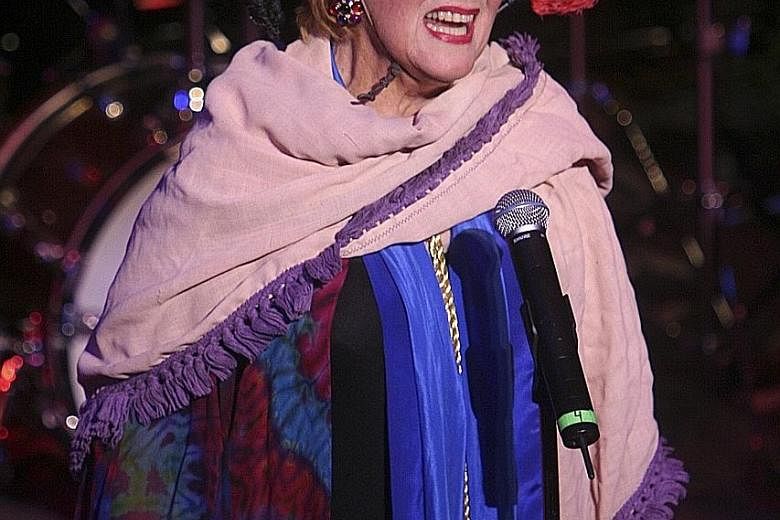WASHINGTON • Marni Nixon, American cinema's most unheralded singer who anonymously dubbed three of the best-loved heroines in Hollywood musicals - Deborah Kerr as Anna in The King And I, Natalie Wood as Maria in West Side Story and Audrey Hepburn as Eliza Doolittle in My Fair Lady - died on Sunday in New York City.
She was 86. Her death, from breast cancer, was confirmed by her daughters, Martha Carr and Melani Gold Friedman.
Sometimes described, much to her chagrin, as the "ghostess with the mostest", Nixon was among the most sought-after movie singers of her era.
She was hired for the uncredited job of providing vocals for stars whose singing ability did not match their acting skills.
Although the practice of dubbing songs was common in the movie industry, executives were worried that if revealed, it might sour audiences on big-budget musicals featuring big names. For that reason, vocalists such as Nixon were contractually obligated to secrecy.
Word about her contributions depended on the graciousness of certain actresses, as when Kerr publicly thanked the singer for helping on The King And I (1956).
Three years earlier, she had assisted Marilyn Monroe with a single, breathy high-note passage in the tune Diamonds Are A Girl's Best Friend in Gentlemen Prefer Blondes (1953).
A soprano of staggering versatility, she performed in recitals at venues including New York's Carnegie Hall and toured with Liberace and Victor Borge.
But no performance reached more ears than her unseen roles in the movies.
Dubbing was demanding work that required the near-total suppression of ego. Nixon recalled being warned that if she ever spoke of her part in the movies, she would "never work in town again".
The work required her to mimic, or as she put it, "extend" the actor's voice.
"That's the whole secret of dubbing," she told The New York Times in 1978. "You imagine how the actress would sing if she could sing and be sure to take from her what she wants to do dramatically."
The King And I, which won an Oscar for the Rodgers and Hammerstein score with numbers such as Getting To Know You, was Nixon's first major Hollywood assignment. Kerr played Anna Leonowens, a 19th-century British widow dispatched to Thailand as a teacher for the many children of a king portrayed by Yul Brynner.
Kerr, she said, worked tirelessly to mimic Nixon's bearing as a singer, while Nixon sought to imitate the actress' diction and presence.
With other singers, the relationship was more fraught. In West Side Story (1961), a modern take on Shakespeare's Romeo And Juliet with music by Leonard Bernstein and lyrics by Stephen Sondheim, Wood was under the impression that Nixon was there for back-up.
When Wood learnt that the film- makers had dubbed her voice, Nixon recalled, the actress was infuriated.
Nixon said that after West Side Story, which won the Oscar for Best Picture and whose soundtrack became one of the most successful albums in history, the anonymity of her work began to gnaw at her.
Bernstein agreed to give her a share of his royalties from the film and she later advocated for vocalists to receive movie credits.
She was uncredited for her role in My Fair Lady (1964), based on the musical with lyrics by Alan Jay Lerner and music by Frederick Loewe. Hepburn, she said, worked hard to master the score, but concluded that the vocals were better entrusted to another singer.
My Fair Lady won the Oscar for Best Picture, but Julie Andrews claimed Best Actress for a rival musical, Mary Poppins.
As it turned out, Nixon could be heard in Mary Poppins in Jolly Holiday, the sequence in which Dick Van Dyke dances with animated animals.
Nixon later appeared with Andrews in The Sound Of Music (1965) as Sister Sophia, a nun at the convent where Maria (Andrews) is a troublesome novice.
Margaret Nixon McEathron was born in Altadena, California, on Feb 22, 1930.
Marni, a combination of the first syllables of her first and middle names, was created for the benefit of a younger sibling who could not pronounce "Margaret".
Her marriages to Ernest Gold, the Oscar-winning composer of the Exodus (1960) soundtrack, and Lajos Frederick "Fritz" Fenster ended in divorce. Her husband of 32 years, Albert Block, died last year.
A son from her first marriage, Andrew Gold, a singer and songwriter whose hits included the theme song of the sitcom The Golden Girls, died in 2011.
WASHINGTON POST, NEW YORK TIMES

